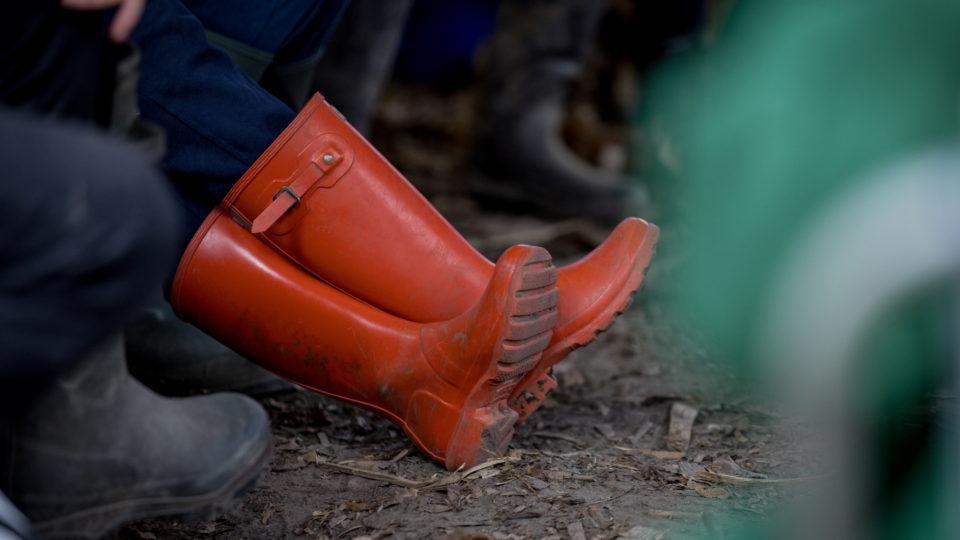A Million & Me – Big Sky Programme
BBC Children in Need is here to make sure that every child has the childhood they deserve and the support they need to thrive.
Our A Million & Me fund supports children aged 8-13 years old. It focuses on their emotional wellbeing and mental health.
This fund aims to provide support at an early stage, before mental health problems are established.
As part of this programme, we focused on the impact of geographic isolation on children’s emotional wellbeing and mental health. Research by the Centre for Mental Health (report) highlights the voices of children are often absent from consultations. Dedicated support and funding should be allocated to reaching children in remote communities.
The Big Sky programme has been developed in response to these needs.
What is the Big Sky Programme funding for?
Big Sky Grants
Big Sky Grants
- Grants are for early intervention approaches. These grants will support the emotional wellbeing and mental health of children aged 8-13 years living in spatially isolated communities.
- This is an invite only programme for organisations working in rural, remote and island areas.
- As applications are by invitation only, they will be developed through conversations with BBC Children in Need teams in each of the 4 nations and draws on our local knowledge and insight.
- We are committed to funding grassroot organisations across the UK, providing those vital positive relationships that support good emotional wellbeing and mental health.
- Funding of up to £5,000 will be awarded although we expect there to be mix in the range of grants awarded.
- Organisations can apply for up to 2 years, with no application deadlines. Applications must fit within BBC CiN localised funding plans and rural identifiers developed at a local level. Contact details for local teams are here.
- Applicants may already hold a grant with us but we are keen to target organisations and groups that have not been funded by us.
- Organisations will only be able to hold one Big Sky grant.
Big Sky Support
Big Sky Support
A tailored support programme for grassroots organisations will be available for funded organisations.
This will include 1-2-1 engagement, sector events, bespoke advice, signposting and training. This support programme will map local provision and connect grassroots projects to each other. It will build confidence through learning, increase influence and engagement with policy makers.
Big Sky Children’s Voice
Big Sky Children’s Voice
This programme will listen, capture and amplify the voices of children living in remote, rural and island isolation across the UK.
Minimum Standards for Grantmaking
BBC Children in Need uses Minimum Standards for grantmaking to look at the strengths of an organisation. We look at areas including your finances, governance, and safeguarding.
The NSPCC offers a free Self-Assessment Tool to help organisations check their current safeguarding and child protection arrangements. We recommend you use this tool before you apply.
Our Minimum Standards at a glance…
Below are the minimum standards an organisation must meet to be eligible for funding from BBC Children in Need’s Big Sky Programme. To be eligible for a grant, an application must also meet additional criteria. Please read our guidance for the Big Sky Programme and our A to Z Guidance.
If you are applying for funding but not applying for the Big Sky Programme, you must meet the Minimum Standards outlined here.
Governance
Your organisation is not for profit
Your organisation is not for profit
By this we mean that all income is used to achieve the organisation’s charitable aims and cannot be paid out to members, shareholders or owners.
A governing document which shows:
Suitable charitable aims that do not specifically exclude work with children and young people within the UK
Suitable charitable aims that do not specifically exclude work with children and young people within the UK
By ‘charitable aims’ we mean a statement that describes the purpose of the organisation. The aims must be for public benefit and must be appropriate for working with children and young people.
A Dissolution Clause/Asset Lock
A Dissolution Clause/Asset Lock
If your organisation closes, any funds would be transferred to another not for profit organisation with similar charitable aims. This is sometimes known as a Dissolution Clause or Asset Lock
A dissolution clause or asset lock describes what happens to any property or money if the organisation closes. To meet our requirements, the clause must say that these are to be given to another not-for-profit organisation with similar charitable aims.
CICs must have an asset lock and must name the selected organisation which funds will be given to. To meet our requirements, this other organisation must have similar charitable aims.
If you currently do not have a suitable dissolution clause or asset lock in your governing document, you may still be eligible to apply to us. If you were successful in receiving a grant, we would require you to have this in place before we release any funding to your organisation. We may be able to offer support to help you achieve this.
A governing body (e.g. Trustees or Directors) of at least three members. At least one member should be independent
A governing body (e.g. Trustees or Directors) of at least three members. At least one member should be independent
By ‘independent’ we mean governing body members who are not related to each other or living with each other.
A formal written agreement for payments of any governing body members
A formal written agreement for payments of any governing body members
BBC Children In Need funds not for profit organisations. Therefore we would not normally expect governing body members to be paid. We would not expect organisations (excluding housing associations) to pay governing body members for their membership of the governing body, other than for legitimate out-of-pocket expenses.
We expect organisations to follow the requirements of their regulator.
If you pay members of your governing body for services outside of their role as a member of the governing body (e.g. as a consultant or a sessional member of staff) you must have:
- a written agreement between the organisation and the individual, which explains what a member of the governing body can be paid to do, when, and how often they can be paid and how much they can be paid
- a conflict of interest policy in place that details how decisions around payments for an individual will be managed by the governing body
If you are a Community Interest Company this must be clearly detailed in your governing document.
If you are a registered charity in England or Wales you must meet all of the following conditions:
- there must be a written agreement between the charity and the charity trustee or connected person. This must set out the amount or maximum amount to be paid
- the charity trustees should be satisfied that it would be in the best interests of the charity for the individual to provide the services proposed
- less than half the total number of charity trustees should be getting paid (directly or indirectly) from the charity
- there is nothing in the governing document of the charity that says you cannot pay a member of your governing body
If you are a registered charity in Scotland you must meet all of the following conditions:
- there must be a written agreement between the charity and the charity trustee or connected person. This must set out the amount or maximum amount to be paid
- there must be nothing in the governing document of the charity that says you cannot pay a member of your governing body
- less than half the total number of charity trustees should be getting paid (directly or indirectly) from the charity
- the charity trustees must have approved the payment
If you are a charity registered in Northern Ireland you must meet the following conditions:
- there must be a written agreement between the charity and the charity trustee or connected person. This must set out the amount or maximum amount to be paid
- there must be nothing in the governing document of the charity that says you cannot pay a member of your governing body
- less than half the total number of charity trustees should be getting paid (directly or indirectly) from the charity
- the charity trustees must have approved the agreement
- the charity trustee being paid must not take part in any decisions about the making of the agreement, the acceptability of the service provided, or setting the price
Finance
Provide official accounts or financial records.
Provide official accounts or financial records.
For this fund we accept:
For organisations with an annual turnover of £10,000 or over:
- a set of recent signed accounts. These should be in the name of your organisation, cover a twelve-month period and be dated within the last 18 months. The accounts should include income, expenditure and any balance sheet items such as assets, liabilities and reserves.
For organisations with an annual turnover under £10,000
- Your income and expenditure for the last 12 months. We do not accept bank statements as evidence of income and expenditure.
If your organisation is in the first 12-18 months of operation and doesn’t have accounts yet you should provide a financial forecast. A financial forecast should include twelve months of projected income and expenditure with some planning / clarity around how you will raise funds.
A process showing your organisation’s financial transactions and payments are reviewed by two unrelated payment authorisers
A process showing your organisation’s financial transactions and payments are reviewed by two unrelated payment authorisers
Financial transactions should be reviewed by two people permitted to authorise those payments. The two payment authorisers should not be related or living together.
Safeguarding
A clear and robust Safeguarding Policy in your organisation’s own name
A clear and robust Safeguarding Policy in your organisation’s own name
We do not accept policies that are in the name of another organisation. For example, a partner organisation, a parent organisation or a related organisation.
Your Safeguarding Policy must include clear steps to take in the event of an incident or concern about a child.
Your Safeguarding Policy must include clear steps to take in the event of an incident or concern about a child.
This should include who to inform and how to contact them.
A named safeguarding representative within your organisation
A named safeguarding representative within your organisation
This person is commonly known as a ‘Designated Safeguarding Lead’. They are responsible for making and managing referrals to social services, reporting when problems are discovered and keeping internal records up to date. They should keep up to date with any changes in this area and attend training to support them to carry out their role. More information can be found here.
Appropriate and regular safeguarding training
Appropriate and regular safeguarding training
All staff, governing body members and volunteers who have face-to-face contact with Children and Young people must receive regular and appropriate safeguarding training.
Training must:
- Cover safeguarding best practice as well as information on the organisation’s safeguarding policies and procedures
- Be appropriate to the nature of the work
- Be refreshed regularly. We advise that this is at least once every three years.
Regular background checks for all people working with children and young people
Regular background checks for all people working with children and young people
All people working with children should be subject to relevant background checks. These would involve Disclosure & Barring Service in England and Wales, Disclosure Scotland in Scotland or Access NI in Northern Ireland. This includes all staff, management committee, trustees or volunteers, who have direct contact with children. Checks must be refreshed regularly. We advise that this is at least every three years however we would expect this to be appropriate to the nature of the work being delivered.
If you are in England and Wales and use the Update Service you should have a process in place to regularly check if there have been any updates or changes. We advise that this is at least every three years however this may need to be more frequent, depending on the nature of the work being delivered.
If you are in Scotland and use Disclosure Scotland PVG check you do not need to refresh or check background checks. This is continually monitored by Disclosure Scotland.
If you currently complete background checks less frequently than every three years, you may still be eligible to apply to us. If you were successful in receiving a grant, we would require you increase the frequency of your background checks before we release any funding to your organisation.
For more information about relevant checks in England and Wales, please visit the gov.uk website.
For more information about relevant checks in Scotland, please visit the myscot.gov website.
For more information about relevant checks in Northern Ireland, please visit the nidirect.gov.uk website.
Who might be invited to apply?
- Not-for-profit organisations working with children and young people aged 18 or under
- Organisations that work with children and young people who live in the UK, the Isle of Man, or the Channel Islands
- If we do not fund your application we will advise you when you are next able to apply to us.
- We seek to prioritise smaller, local organisations. As a result for project costs we will rarely fund organisations with an annual turnover of more than £2 million in the most recent, complete financial year. We understand that there are some organisations with higher income that deliver vital work for Children and Young People. We will accept applications from the following organisations regardless of their turnover.
-
-
- Hospices (incl. Children’s Hospices)
- Housing Associations
- Applications which will deliver nationwide or UK-wide work. (i.e. working across a whole nation, or multiple nations within the UK)
-
-
- We understand that in certain circumstances, larger and/or national organisations can be best placed to deliver work to the communities that need it most
- If an organisation is delivering in more than one nation in the UK – they are able to apply to and hold a project grant in more than one nation (England, Northern Ireland, Scotland or Wales) at any one time.
The people and organisations that BBC Children in Need fund will be:
- Working with children and young people aged 18 years and under
- Working in the heart of their communities, particularly in times of crisis
- Putting children and young people at the centre of everything they do, from design to delivery
- Addressing challenges faced by children and young people, building their skills and resilience
- Empowering children and young people, and extending their choices in life
- Keen to keep learning about and developing their work with children and young people
- Committed to making a difference in children and young people’s lives
BBC Children in Need doesn’t fund:
- Work that statutory bodies (such as schools or local authorities) have a duty to fund
- Educational institutions, including schools, universities, and pupil referral units. Special schools are the only exception; please see our A–Z Guidance for more detail
- Local government, prisons, or NHS bodies
- Capital or building projects
- Projects that promote religion
- Trips abroad, or other activity taking place outside the UK
- Medical treatment or research
- Pregnancy testing or advice, information, or counselling on pregnancy choices
- Awareness-raising work, except where targeted at children or young people most at risk
- Bursaries, sponsored places, fees, or similar costs
- Holidays where there is little or no project involvement
- Political activity, including party political organisations or direct lobbying
- Individuals
- Costs passed on to other organisations
- General appeals or endowment funds
- Help with budget shortfalls or debt repayments
- Work that has already taken place – or any costs incurred – before the date we give you a decision (retrospective funding)
- Projects unable to start within 12 months of the grant award date
- Unspecified expenditure
- Any activity that is already being funded through another grant. We cannot fund the same activity twice. All applications should clearly demonstrate that they are either for different work, or for work with a different cohort of children and young people.
What do I need to know?
It’s very important that you refer to our online A–Z Guidanceif you are invited to apply for funding. It may also save you the time and effort of applying for costs we don’t fund. You should also check that you meet our Minimum Standards, as outlined above.
Our A-Z Guidance includes details of our grantmaking policies. Some will be relevant to every application, such as our Safeguarding Children policy. Others are important for certain types of applications, such as work involving counselling, or projects seeking funding for equipment.
Cymraeg/Welsh
Am y dudalen Cymraeg cliciwch yma.


